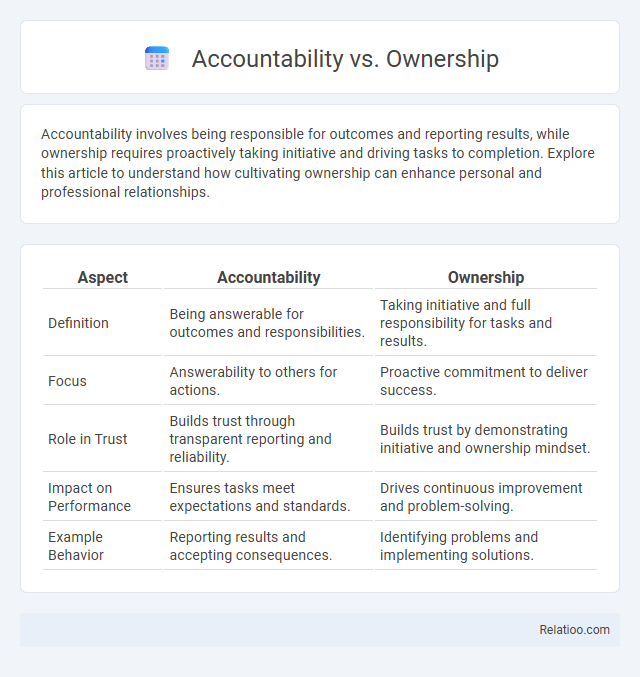Accountability involves being responsible for outcomes and reporting results, while ownership requires proactively taking initiative and driving tasks to completion. Explore this article to understand how cultivating ownership can enhance personal and professional relationships.
Table of Comparison
| Aspect | Accountability | Ownership |
|---|---|---|
| Definition | Being answerable for outcomes and responsibilities. | Taking initiative and full responsibility for tasks and results. |
| Focus | Answerability to others for actions. | Proactive commitment to deliver success. |
| Role in Trust | Builds trust through transparent reporting and reliability. | Builds trust by demonstrating initiative and ownership mindset. |
| Impact on Performance | Ensures tasks meet expectations and standards. | Drives continuous improvement and problem-solving. |
| Example Behavior | Reporting results and accepting consequences. | Identifying problems and implementing solutions. |
Understanding Accountability and Ownership
Accountability refers to the responsibility individuals have to report, explain, and be answerable for resulting outcomes, while ownership emphasizes a proactive commitment to tasks and initiatives beyond mere responsibility. Understanding accountability involves recognizing the obligation to deliver results and accept consequences, whereas ownership requires taking initiative and driving continuous improvement in projects or roles. Both concepts are critical for organizational success, with accountability ensuring clarity in expectations and ownership fostering engagement and innovation.
Key Differences Between Accountability and Ownership
Accountability involves being responsible for outcomes and answering to others for results, whereas ownership refers to taking initiative and full control over tasks or projects without external pressure. Your ability to demonstrate ownership shows proactive engagement and commitment beyond mere obligation, while accountability emphasizes transparency and answerability. Understanding these key differences helps in fostering a culture where individuals not only meet expectations but also drive success through personal investment.
Why Accountability Matters in the Workplace
Accountability in the workplace drives teams to meet goals efficiently and maintains a culture of trust and reliability, essential for overall business success. Ownership empowers employees to take initiative and solve problems proactively, fostering innovation and continuous improvement within your organization. When accountability aligns with ownership, it ensures clear responsibility, reduces errors, and enhances performance, making it a critical factor for your company's growth and employee engagement.
The Importance of Ownership in Team Performance
Ownership drives team performance by fostering a sense of responsibility and commitment to outcomes, beyond mere accountability for tasks. When you take ownership, you proactively identify solutions and drive progress, enhancing collaboration and innovation within the team. This mindset transforms individual contributions into collective success, setting high standards and promoting continuous improvement.
How Accountability Drives Results
Accountability drives results by ensuring individuals take responsibility for their actions and outcomes, leading to increased commitment and performance. When you embrace accountability, tasks are completed efficiently, goals are met, and organizational success is accelerated through clear expectations and continuous feedback. This culture of accountability fosters trust and motivates teams to achieve higher standards and deliver measurable results.
Fostering an Ownership Mindset Among Employees
Fostering an ownership mindset among employees involves encouraging personal accountability for tasks while empowering individuals to take initiative and make decisions beyond their formal responsibilities. This approach promotes proactive problem-solving and drives business results by instilling a sense of commitment and autonomy. Creating a culture that rewards ownership behaviors leads to higher engagement, increased innovation, and sustained organizational success.
Challenges in Balancing Accountability and Ownership
Balancing accountability and ownership presents challenges such as unclear role definitions that lead to overlapping responsibilities and potential conflicts. Employees may struggle with prioritizing tasks when ownership is emphasized without clear accountability frameworks, resulting in decreased productivity and misaligned goals. Effective communication and transparent performance metrics are essential to mitigate these issues and foster a culture where both accountability and ownership coexist constructively.
Strategies to Cultivate Both Accountability and Ownership
Cultivating both accountability and ownership requires clear goal-setting, transparent communication, and empowering individuals with decision-making authority to foster a sense of responsibility. Implementing regular feedback loops and performance metrics enhances self-awareness and reinforces commitment to outcomes. Encouraging a culture of trust and recognition motivates proactive problem-solving and dedication to team success.
Measuring Success: Accountability vs. Ownership Metrics
Measuring success in accountability involves tracking adherence to responsibilities and meeting predefined standards, while ownership metrics focus on evaluating initiative, problem-solving, and proactive contributions to outcomes. Your team's performance improves when accountability ensures tasks are completed timely, and ownership drives innovation beyond assigned duties. Combining these metrics provides a holistic view of both compliance and engagement in achieving organizational goals.
Building a Culture of Responsibility and Initiative
Building a culture of responsibility and initiative requires distinguishing accountability, ownership, and responsibility, where accountability emphasizes answerability for outcomes, ownership reflects proactive engagement and commitment to tasks, and responsibility entails fulfilling assigned duties. Organizations that foster ownership encourage employees to take initiative beyond their roles, driving innovation and problem-solving. Embedding clear accountability structures alongside empowering ownership cultivates an environment where individuals are motivated to act decisively and accept consequences, enhancing overall performance and trust.

Infographic: Accountability vs Ownership
 relatioo.com
relatioo.com